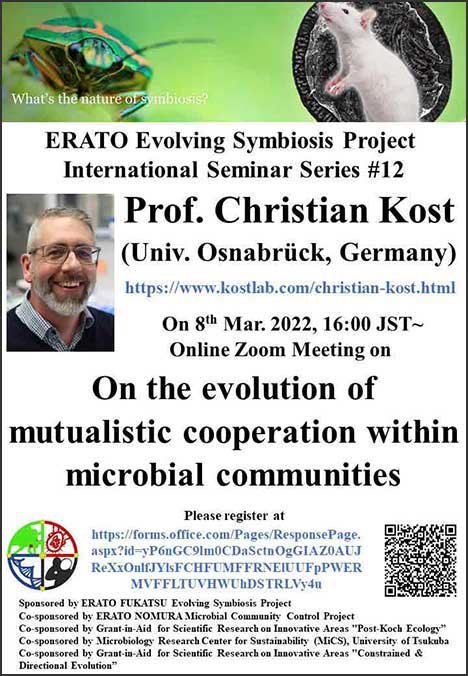ERATO Evolving Symbiosis Project International Seminar Series #12
Prof. Christian Kost (University of Osnabrück, Germany)
“On the evolution of mutualistic cooperation within microbial communities”

Abstract: Cooperative interactions challenge evolutionary theory: why should one organism invest costly resources to benefit other individuals rather than using them to enhance its own fitness? Despite this conundrum, obligate interactions, in which two or more organisms exchange costly metabolites, are very common in nature. However, the factors facilitating the evolution of metabolic cooperation remain poorly understood.
We address this issue by using microbial communities as tractable model systems. Our experiments reveal that adaptive advantages drive the evolution of cooperative cross-feeding within microbial communities: by losing the ability to autonomously synthesize certain metabolites, bacteria become dependent on other community members producing these compounds. The resulting metabolic interdependencies trigger a coevolutionary process, during which reciprocal cooperative investments increase rapidly.
In my talk, I will discuss the evolutionary drivers of this process and highlight how the emergent population dynamics enhances cooperativity within physiologically interconnected consortia.
ERATO Evolving Symbiosis Project International Seminar Series #12
Sponsored by ERATO FUKATSU Evolving Symbiosis Project
https://www.jst.go.jp/erato/fukatsu/english/
Co-sponsored by ERATO NOMURA Microbial Community Control Project
https://www.jst.go.jp/erato/nomura/en/index.html
Co-sponsored by Grant-in-Aid for Scientific Research on Innovative Areas "Post-Koch Ecology”
https://postkoch.jp/about/
Co-sponsored by Microbiology Research Center for Sustainability (MiCS), University of Tsukuba
https://www.mics.tsukuba.ac.jp/en
Co-sponsored by Grant-in-Aid for Scientific Research on Innovative Areas "Constrained & Directional Evolution”
http://constrained-evo.org/english.html


